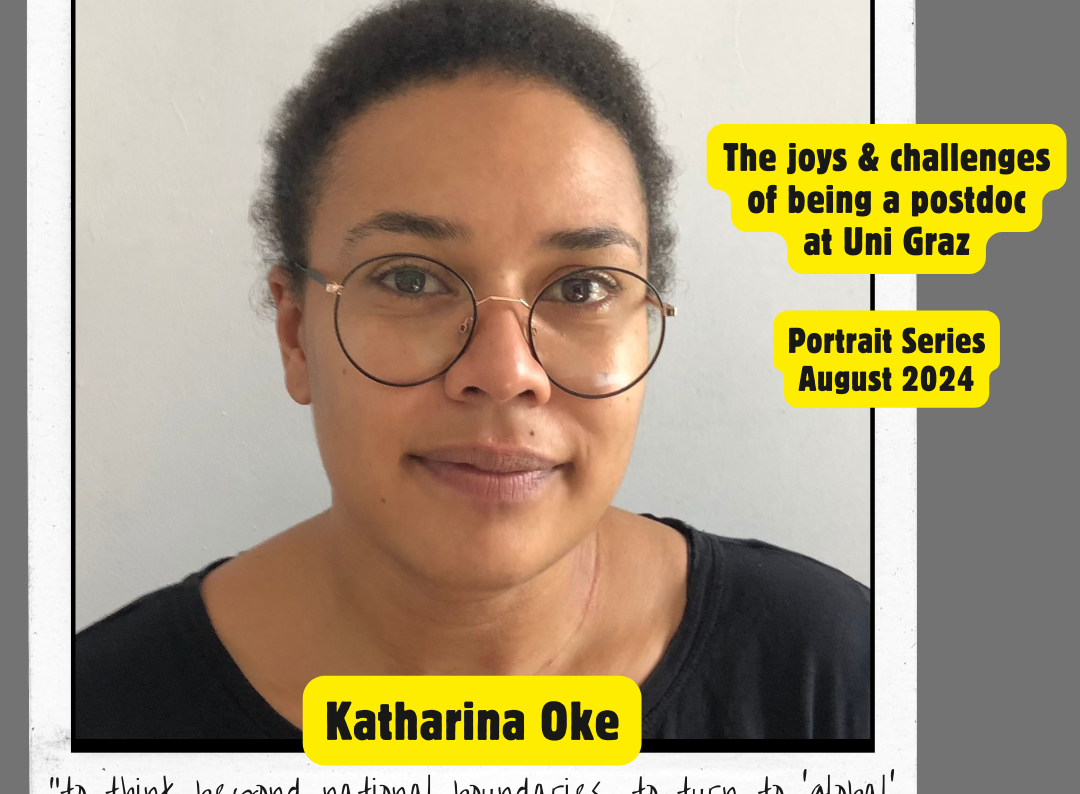This summer, you have the opportunity to get to know some of the brilliant postdoctoral researchers at our university. Our portrait series highlights the diversity within this group of University of Graz research talents - and obviously the fascinating research that they do. Here are four questions for....
Katharina Oke, Department of History
1) Tell us a little about yourself, and your journey to become a researcher at Uni Graz.
I studied Journalism and African Studies in Vienna before I moved to the UK for a PhD in Global and African History at the University of Oxford. After this, I worked for more than two years as a Lecturer in Modern African History at King’s College, London. I came to Graz in 2020 to join the new Chair for Global Contemporary History. This was and is an exciting opportunity to be part of a team building and expanding the teaching and research of Global History in Graz. In particular, to contribute to research and teaching on Global History from a perspective that is grounded in African history and includes the African diaspora.
2) What are you currently researching, and why do you think it is important (or interesting)?
Currently, I am Marie Skłodowska-Curie Global Fellow at Graz, working, in partnership with the University of Ibadan (Nigeria), as the Principal Investigator on a EU-funded project: “A History of ‘Making Things’ in West Africa: Creating, Meaning Making, and Experience, ca. 1920-1980”. [https://making-in-wa.uni-graz.at/en/]. I am studying the “making of things” in Lagos (Nigeria) and Accra (Ghana) through a focus on artisans and craftspeople, specifically goldsmiths and bakers.
While studies of entrepreneurship in Africa often focus on capital accumulation and poverty alleviation, this project brings together economic history, social and cultural history, approaches form anthropology and the history of science and knowledge. It turns to knowledge of and about making, the meaning of making, and experiences and modes of making. It therefore offers a different perspective on and a deeper understanding of productive processes and the range of agency animating entrepreneurial labour. It seeks to complicate concepts such as “innovation” and the ways in which African societies form part of the growing scholarship on the global history of capitalism.
3) What gives you joy in your everyday work life & what are some challenges?
What I particularly enjoy in teaching is kindling student’s enthusiasm for Global and African history – to invite and encourage them to think beyond national boundaries, to turn to ‘global’ structures and dynamics, and to challenge Eurocentrism. With regards to research, I currently enjoy learning with and about oral history, which I am using for the first time in my current project. And perhaps this is also how I have been challenging myself lately – learning and practicing ‘new’ methods and continuously reflecting on my research practice.
More generally, I particularly enjoy working on collaborative projects, such as the online public engagement project featuring different perspectives and voices on Global History, which we are currently developing at Graz.
4) What's next for you this year/next year?
My Marie Skłodowska-Curie Fellowship ends early next year, so I am currently busy preparing publications and conference presentations coming out of the project. Next year, I will turn again to teaching, and I am excited to also share some of the project results in this way. Moreover, I look forward to develop and implement new research projects which build on the current project, but also explore new themes. Also, after a period of frequent travelling for research, I look forward to realize some of the sewing projects I have been conceptualizing since the beginning of this year.
- Questions: Johanna Stadlbauer July 2024
- Picture credit: Oke/privat
- All portraits in this August 2024 series can be found here.
